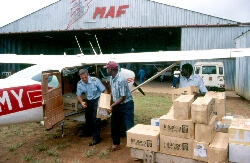
of the Congolese medical community joined church and mission leaders,
relief workers and Congolese government officials in celebrating 50
years of Mission Aviation Fellowship service in the Democratic
Republic of the Congo.
MAF is a Christian ministry organization that uses airplanes and other
technologies to serve church and relief organizations in remote areas of
the world.
During a gathering at the International Protestant Church of Kinshasa
last month, Dr. Tony Karemere of the Institut National de Recherche
Biomédicale commended MAF’s commitment to sharing the gospel and
providing access to medical care. Karemere emphasized MAF’s work to
combat Ebola epidemics in 1995 and 2007, as well as the measles outbreak
that threatened the DRC this spring.
“MAF was the only aviation company who accepted this task—to fly
international medical personnel and a mobile laboratory into the hot
zone of the [Ebola] epidemic and to fly personnel out of that area,”
says Karemere. “In the recent measles outbreak, the areas that were
affected were difficult to reach, and with MAF we were able to get into
those areas and transport the needed vaccines.”
In the DRC, MAF operates from bases in Kinshasa, Bunia and Lubumbashi.
MAF often conducts emergency medical evacuations and provides support to
those working in refugee camps or assisting victims of militia
violence.
Dr. Makuma Booto Baudouin from the DRC Ministry of Health remarked on
the vital role MAF plays in DRC: “Each year MAF transports vaccinations
for 39,000 to 40,000 children in the Bandundu region. I thank God for
MAF and their partnership now and into the future.”
MAF began serving in DRC in 1961 at the request of the Protestant Relief
Agency. Following revolt and tribal warfare in the country in
1960, the medical situation was dire, with only 200 doctors in the
entire country to care for millions of people. With the assistance of
MAF, PRA initiated “Operation Doctor” to bring healthcare to remote
villages. Initially using two planes, MAF flew five teams of doctors
between remote clinics, where hundreds of people would typically be
waiting to see the physicians.
Former U.S. Surgeon General C. Everett Koop was part of “Operation
Doctor.” Koop, now 94, recalls flying with MAF pilots in the early
1960s as they performed airdrops of medical supplies.
“They took off from the airport in Kinshasa, and they headed for
pre-arranged parachute drops,” says Koop. “It was said that there wasn’t
an aspirin tablet from coast to coast since the missionaries went home
… The MAF pilot took that stuff and dropped it, and thereafter there
was no trouble.”
Through the years, MAF’s presence in DRC has been marked by unique
challenges. Political unrest and threatening bush warfare have caused
several evacuations of MAF staff. In 2002, the MAF base at Nyankunde in
eastern DRC was destroyed during fighting by two tribal factions.
Fortunately, no MAF staff were killed, and the ministry still serves
east DRC from its Bunia base. Click here to read more about the Nyankunde
incident.
“Longevity in any area of ministry is difficult to achieve,” says John
Boyd, president and CEO of MAF-US. “Serving in the DRC is a calling that
MAF takes seriously and counts as a privilege.”






Leave a Comment
You must be logged in to post a comment.